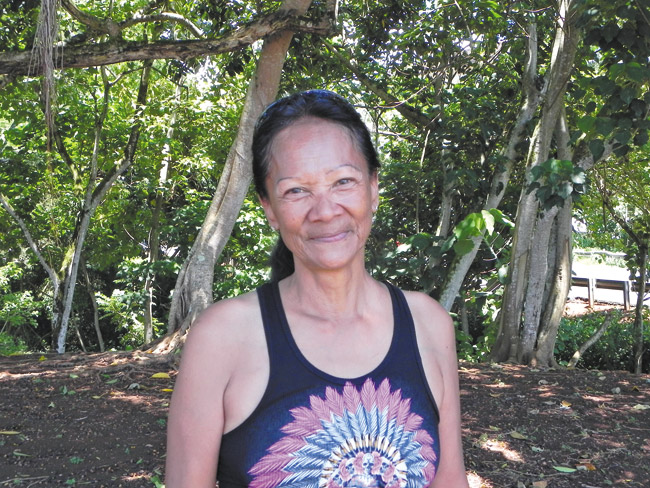Hilda’s Story Is A Message To Us All
Hilda Leinani Kealoha Jenkins was not who I was expecting when I met her in the parking lot of a fast-food restaurant in Wahiawa. She had been described to me as a former trucker — and tough. The woman who stood before me clutching a hardback Terry Brooks novel was so petite I thought I could knock her down with a feather. She was neat as a tiny pin, hair pulled back in a ponytail, her faded clothes impeccably clean.
And she was — is — homeless.
That surprised me, too. Not because of her appearance, but because I’d been told she works as a caregiver for an elderly woman, and I had assumed she had a place to live.
Never assume. It’s a lesson I learn again and again.
I arranged to meet Hilda to talk about Hawaii Foodbank and why it’s important in her life. Over lunch (my treat) she told me about her circumstances. And I was floored.
Hilda is a sobering reminder to me — and should be to all of us — that every person out there that we label collectively as “the homeless” has a story, a life and soul-crushing challenges that would be difficult for anyone to overcome.
Turns out, Hilda was living in a hollowed-out tree. It was a hidden pocket somewhere in Wahiawa where she could hide and survive. She didn’t want to reveal its location, understandably, because it was safer if no one knows. She did errands for a woman in a wheelchair in exchange for the use of the woman’s shower.
Look at her picture. Know her. Understand that Hilda Jenkins is a strong, intelligent, good woman who has to fight every day just to stay clean and keep herself fed, healthy and safe.
And understand this, too: Hilda doesn’t want to be taken care of. She doesn’t want to be a burden on the state.
“I’ve always worked. And people say, ‘Why don’t you get on disability?’ Why? Because I’m not disabled! That’s not me. I’m capable of working. I’ve got respect for myself.”
She’d been trying for months to find a job, and was barely holding on to that self-respect.
“I hit every place (in Wahiawa) that had an opening,” she told me. “At least 15, 20 places. And I’ve even gone on the Internet and filled out for the state of Hawaii school district for custodial or anything.”
There are reasons the limited Hawaii job market is too often out of reach for people like Hilda. She has no permanent address. She has no phone. She tries to be presentable and her clothes are clean, but threadbare. She has no car.
Hilda is Hawaiian, a child of our Aloha State. She grew up in Hauula and moved to the Mainland when she was a teenager after her mother married a Navy man. After decades away, she came home to Hawaii to start a new life. She moved in with a person who offered her a place to stay — someone she knew from her childhood and thought she could trust.
Things did not go as planned. “He got stupid. And … he tried to molest me. I called the police. He kicked me out. And I was out on the streets.”
So there she was, a 60-year-old woman with no money, no job, no car and no home. About all Hilda had and still has are her pride and a fighting spirit. She needs that spirit because, as she makes very clear to me, being homeless is hard, hard work. Even something as simple as keeping her clothes clean was a struggle.
“You wash your clothes by hand. Get the water, get a little soap, use the bucket. Wash clothes.”
And food … well, food was tricky. She would go to four or five distributions at different churches not because she was greedy, but because she couldn’t bring a lot of food “home” — it couldn’t be refrigerated — so she had to go more often.
There are a lot of folks who think “the homeless” are all lazy and would rather leech off the system than get a job. Please reconsider. Think of Hilda. Think of how being homeless complicates her search.
Hilda told me she felt like she was drowning. “It’s like a whirlpool,” she said, that was sucking her farther and farther down.
Despite all this stress, Hilda astonished me with her grateful attitude and her fighting spirit. She just wouldn’t give up.
UPDATE: I think this story might end up having a happy ending. I’ve just learned Hilda is now in a shelter. She’s working with a social worker. They say she’s doing well. I can’t tell you how relieved I am.
But I’m also aware that there are more Hildas out there — more men and women, more children, more families who live under the radar and seemingly out of reach of our help. We have to bring them into the light. And we cannotgive up on them or ignore them.
P.S.: Someone, please hire Hilda. The woman wants to work.
jmoonjones@yahoo.com
Twitter: @JadeMoon1






